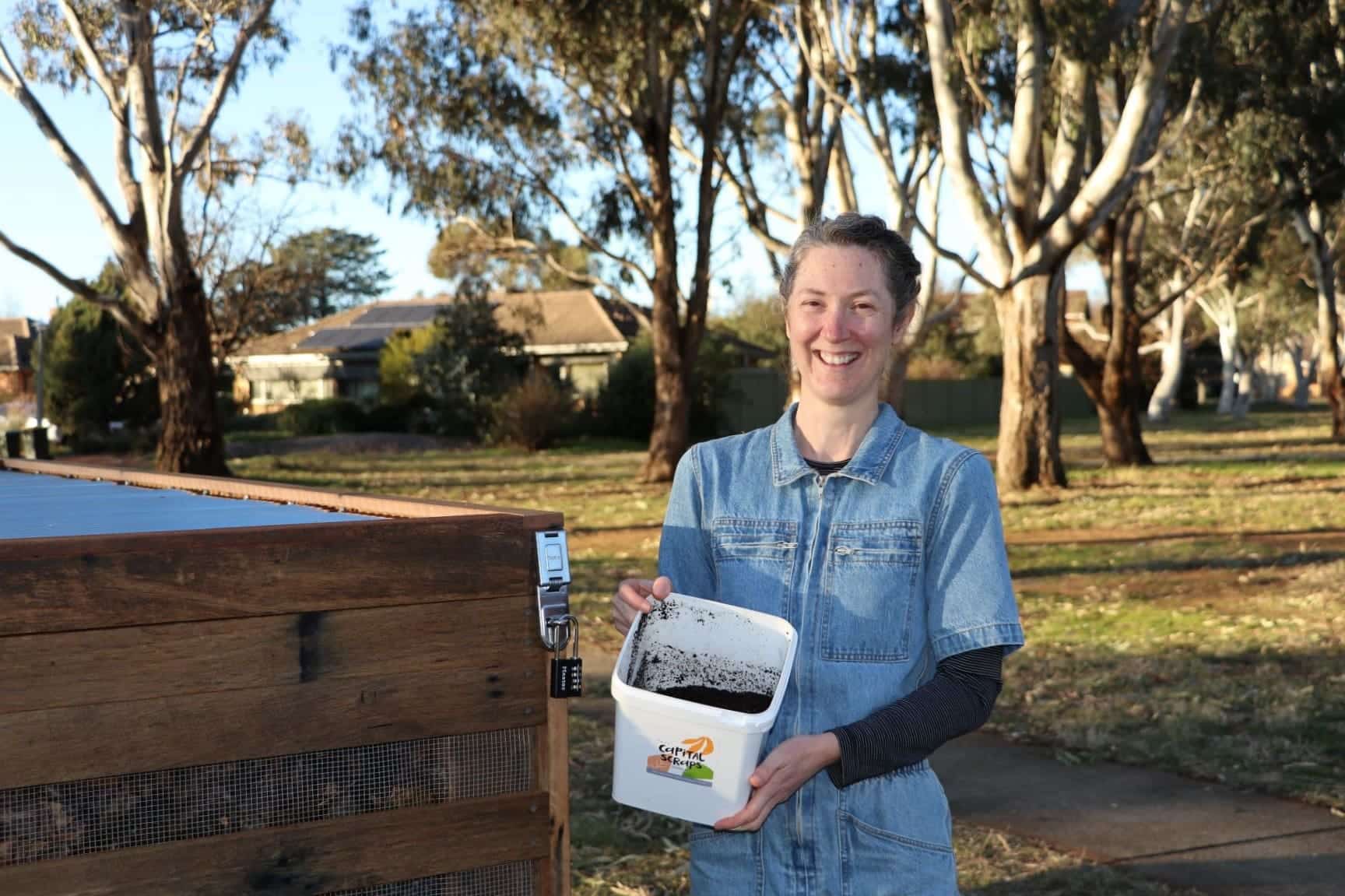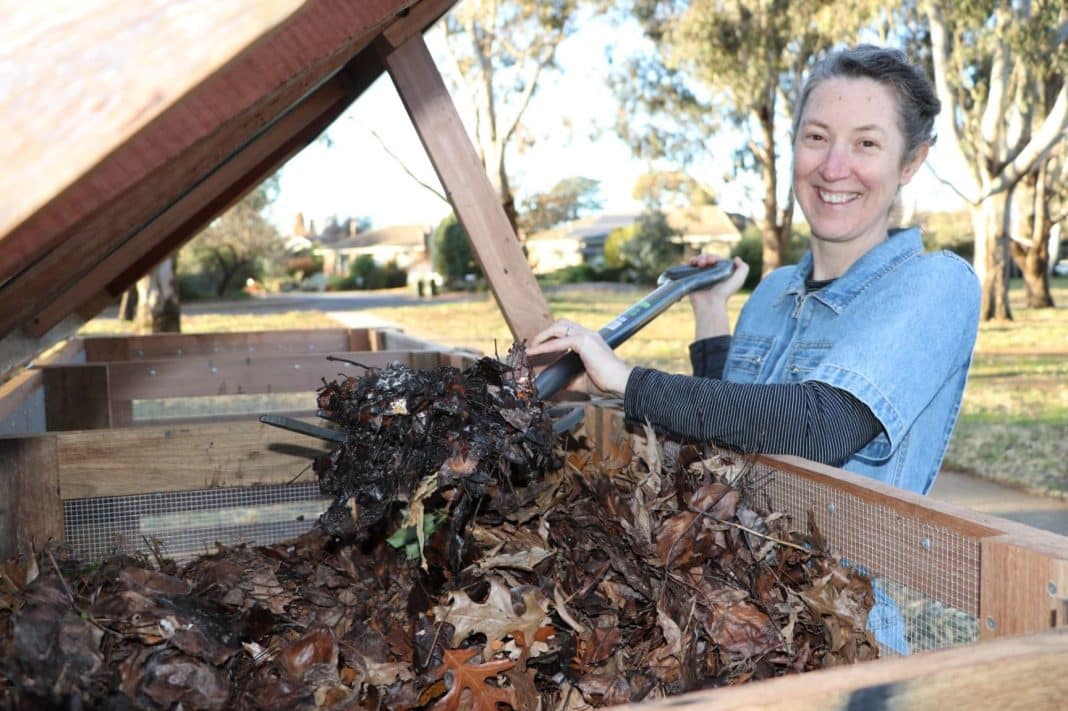What started off three years ago as a one-woman backyard science experiment has turned into an independent Canberran composting collective, with ambitions to turn all the ACT’s food scraps into quality soil.
Brook Clinton, 43, the original ‘Capital Composter’, rides her bike across Canberra gathering food scrap buckets from people’s homes and turning the contents into top of the range compost.
With a PhD in Biochemistry, Brook began her Capital Scraps organisation with a desire to put her extensive knowledge to good use, but she admits there’s not a lot of high paying jobs in the sector.
A passionate compost activist, she says she has the process perfectly down pat these days.
“I started with a little prototype composter, and I just really wanted to push the process because I know that it works out quite nicely that if you get it really efficient and creating compost really quickly, it’s also a lot better for the environment,” Brook says.
“Our main aim is to prevent the formation of methane. So, any food waste or organic materials that go to landfill is slowly ‘zombifying’ and leaching out a little bit of methane and other nastiness.
“It makes a whole lot of sense with all the small amounts of food scraps that are forming from households that we can actually compost within our suburbs, and we can process it really efficiently in a small space. Our composters are only three metres long and we can nestle them in a park and do a whole lot of good with them.”

Capital Scraps has even expanded to collecting from entire apartment blocks, by setting up a bucket in the waste room, and Brook says it’s working quite well.
The idea of having a composting collection service shouldn’t be something out of the ordinary; we put out our rubbish and recycling bins, so why not a compost bucket, too?
All those local residents involved with the service need worry about is remembering to put their parcel of scraps next to the letterbox.
While the ACT Government is currently trialing a city compost collection service named FOGO in four Belconnen suburbs, Brook says she’s trying to fill the gap until Canberra is able to have a city-wide service.
Currently, Capital Scraps covers the suburbs of Hackett, Ainslie, Watson and Braddon, and has plans to expand to Turner and Campbell in the near future – but it all depends on how much interest the local community shows.
“We’ve got about 200 odd subscribers at the moment, and we really need at least 1000, so we need to grow by about five times to just be fully financially sustainable,” Brook says.
“We also want to do lots of education off to the side as well to try to cover the whole picture … I’d just love for every Canberra household to have access to composting in some form or another.”
Brook says the difference between Capital Scraps and the ACT Government’s FOGO initiative is her organisation is “a little bit more environmentally friendly”.
“We do pick it up on a bike, I was actually on it this morning, and we collect door to door which is lowering emissions, and the particular way we do the composting avoids more of the methane load,” she says.
“I like to think of it as artisan compost, because we are doing it at the human scale. We use manual labour – we get in there every three days with a pitchfork and turn it over – and that’s how we get the efficiency.”
“I like to think of it as artisan compost, because we are doing it at the human scale. We use manual labour – we get in there every three days with a pitchfork and turn it over – and that’s how we get the efficiency.
“We make compost in under a month, and that’s just keeping the process humming along and really healthy and absolutely minimising methane; there is only trace quantities.”
Dumping food scraps into landfill is an expensive and unwise option, says Brook, and Canberrans should be thinking more about the circular nature of our rubbish.
Through Capital Scraps locating their composting stations in public areas, she’s hoping to put people back in touch with the idea of a circular economy, while also creating conversation and interest in compost.
“It’s about getting people into the idea of what a biobased material is and how it can just be fed back into the soil, and how healthy soil help us in terms of the atmosphere – it’s all tied together,” says Brook.
“I think what’s really been missing is that step of how do you get from a banana peel to something that looks like soil.
“It seems like magic to a lot of people, but that’s why we’re really keen on doing the composting in ordinary parks and ordinary streets so that people can just get a bit of familiarity with the process.”
Once the food scraps have been turned into the gold standard compost, Brook says the local community benefits once again.
If you’re a participant you can simply ask for it back for your private garden, community gardens have asked to receive some, and even a local primary school has asked for a mound to help create their own veggie patch on campus.
“The way that we are all brought up is you separate your waste, but then it just goes in a bin and is off to some mysterious place,” says Brook.
“But because we can do the composting in the suburbs, people can have a bigger connection with it, and understand that it can go back into creating better gardens, right here.”

To register for compost collection visit https://www.compost.org.au/if the service isn’t available in your suburb yet, you can pledge your interest through the sign up form.
Canberra Daily would love to hear from you about a story idea in the Canberra and surrounding region. Click here to submit a news tip.



